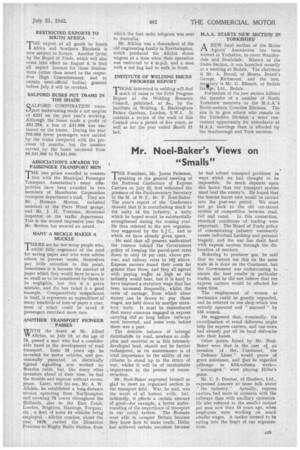Mr. Noel-Baker's Views on "Smalls"
Page 21

If you've noticed an error in this article please click here to report it so we can fix it.
THE President, Mr. James Paterson, speaking at the general meeting of the National Conference of Express Carriers on July 22, first welcomed the presence of the Parliamentary Secretary to the M. of W.T., Mr. P. Noel-Baker. The year's report of the Conference showed that it is contributing much to the unity of the industry, a unity which he hoped would be substantially strengthened during the coming year. He then referred to the new organization suggested by the S.J.C., and to which we have already given space.
He said that all present understood the reasons behind the Government policy of keeping the parcel-post rates down to only 10 per cent. above prewar, and railway rates to 16f above, Express carriers found their costs far greater than these, and they all agreed with paying wages as ,high as the industry would bear, but it is hard to have imposed a statutory wage that has been increased frequently, whilst the rates of carriage, from which alone money can be drawn to pay those wages, are held down by another statutory body. It must be remembered that many concerns engaged in, express carrying did so long before railways were invented, and some even before there was a post.
The delicate balance of internal distributie1n by road, nowhere so complex and essential as in this intensely developed land, should not be further endangered, as its maintenance is of vital importance to the ability of our citizens to stand up to the strain of War, whilst it will be of incalculable importance in the process of reconstruction.
Mr. Noel-Baker expressed himself as glad to meet an organized section in the transport field. War, he said, was the worst of all human evils, but, indirectly, it effects a certain amount of good—for example, a better understanding of the imporeance of transport in our social system. The Romans were able to conquer Britain because they knew how to make roads; Hitler has achieved certain successes because he had solvedtransport problems in ways which we had thought to be impossible. So much depends upon this factor that our transport system must beat the enemy's. He hoped that the lessons learnt now would be carried into the post-war period. We must not go back to the old cut-throat system of competition between road, rail and canal. In this connection, standard conditions of loading were important.. The Board of Trade policy of concentrating industry necessarily causes individual hardship and personal ' tragedy, and the war has dealt hard with express carriers through the dislocation of markets.
Referring to producer gas, he said that we cannot use this on the same scale as is done on the Continent, but
the Government was endeavouring -to ensure the best results in particular
trades, and he did not believe that the express carriers would be affected for some time.
The employment of women as mechanics could be greatly expanded, and he referred to one shop ,which was entirely operated and " manned " by 150 women.
He suggested that, eventually, the co-ordination of retail deliveries might help the express catriers, and one town had already put all its local deliveries into their hands.
Other points faised by Mr. NoelBaker were that in the case of,, an invasion of the. Continent, the
Defence 'Lines " would prove of great assistance, and that he regarded 'pilferage as fifth-column work" scroungers," were playing Hitler's game. • Mr. C. S. Dunbar, of Hauliers, Lid., expressed concern at loose talk about
" the industry." Actually, express carriers had more in common with the railways than with ancillary operators. He also referred to the smaller output per man now than 10 years ago, when employees were working on much smaller wages. A canker seemed to be eating into the heart of our. organizations.




















































